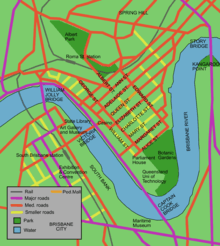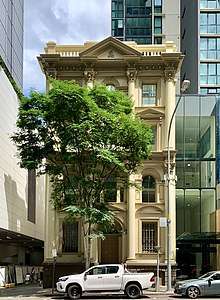Charlotte Street, Brisbane
Charlotte Street is a road in the central business district of Brisbane, Queensland, Australia. The street is one of a number that were named after female queens and princesses of the royal family shortly after the penal colony was settled. Mary Street runs parallel to the south and Elizabeth Street is the next street to the north.

The one-directional road begins at a T-intersection where Creek Street becomes Eagle Street, close to the Brisbane River. Charlotte Street ends at another T-intersection with George Street. Here lies the 111 George Street tower containing mostly government offices.

Charlotte Towers and Festival Towers are two tall residential buildings in Charlotte Street. The Elizabeth Arcade, St Stephens Cathedral, Comalco Place and The Pancake Manor are some of the other notable buildings located on Charlotte Street.
A number of multi-storey car parks have been built on the road. A police station once located on the Queen Street Mall was transferred to Charlotte Street. The iconic Victory Hotel, also on Charlotte Street, closed on 27 July 2008 after a fire destroyed the premises.[1] It has since re-opened in its original form.
History
The Greek Association of Brisbane was established in 1913. In May 1921 it purchased Concordia Hall at 44-48 Charlotte Street (27.4717°S 153.0259°E) and renamed it Hellenic House to be used as a gathering place for the Greek community.[2] Greek Orthodox services in Brisbane were initially conducted in St Luke's Anglican Church (also in Charlotte Street) and the Wharf Street Congregational Church,[3][4] until St George's was officially opened as the first Greek Orthodox church in Queensland in front of Hellenic House on 30 March 1929.[5][6] However, the growth in Brisbane's Greek population, particularly after World War II, resulted in a need for a larger church. A new St George's Greek Orthodox Church was built at 33 Edmondstone Street (corner Besant Street) at South Brisbane (27.4799°S 153.0156°E) and opened on 24 April 1960.[7] A new Greek community centre (now the Greek Club) was built beside the South Brisbane church, opening in 1976. The Charlotte Street property was sold in 1981 and the Greek buildings on the site no longer exist.[8]
Heritage listings


Charlotte Street has a number of heritage-listed sites, including:
- 10 Charlotte Street: former St Luke's Church of England, now The Pancake Manor[9]
- 26 & 36 Charlotte Street: John Reid and Nephews Building facade[10]
- 40 Charlotte Street: John Mills Himself Building[11]
- 42 Charlotte Street: George Weston and Sons Workshop[12]
- 120 Charlotte Street: Pan Australia House facade[13]
- 139 - 145 Charlotte Street: Charlotte House[14]
- 163 Charlotte Street: Walter Reid Building facade[15]
- 168 Charlotte Street: F.H. Faulding Warehouse[16]
- 172 Charlotte Street: St Stephens School[17]
- Sections of Albert St, George St, William St, North Quay, Queen's Wharf Rd: Early Streets of Brisbane (incorporating land now on Charlotte Street)[18]
- 110 George Street and 84 William Street: the former Queensland Government Printing Office[19]
Lost heritage includes:
- Brisbane Festival Hall (formerly Brisbane Stadium) on the southern corner with Albert Street
Major intersections
- George Street
- Albert Street
- Edward Street
- Creek Street / Eagle Street
See also
References
- Simon O'Brien (14 August 2008). "Victory patrons call for rise from the ashes". Brisbane Times. Retrieved 10 September 2008.
- "CONCORDIA HALL". The Brisbane Courier (19, 766). Queensland, Australia. 28 May 1921. p. 5. Retrieved 6 August 2020 – via National Library of Australia.
- "ANGLICAN CHURCH". The Telegraph (16, 010). Queensland, Australia. 22 March 1924. p. 18. Retrieved 5 August 2020 – via National Library of Australia.
- "NEW GREEK PASTOR". The Week. CV, (2, 725). Queensland, Australia. 16 March 1928. p. 16. Retrieved 5 August 2020 – via National Library of Australia.CS1 maint: extra punctuation (link)
- "GREEK CHURCH". The Telegraph (17, 573). Queensland, Australia. 1 April 1929. p. 8. Retrieved 5 August 2020 – via National Library of Australia.
- "THE FIRST IN THE State". The Evening News (2360). Queensland, Australia. 2 April 1929. p. 8. Retrieved 5 August 2020 – via National Library of Australia.
- "History of the Greek Orthodox Church in Brisbane". Brisbane Times. 27 April 2014. Retrieved 5 August 2020.
- "Church History". GOC St George. Retrieved 5 August 2020.
- "Pancake Manor (entry 600083)". Queensland Heritage Register. Queensland Heritage Council. Retrieved 19 June 2013.
- "John Reid and Nephews Building facade". Brisbane Heritage Register. Brisbane City Council. Retrieved 10 March 2015.
- "John Mills Himself Building (entry 600084)". Queensland Heritage Register. Queensland Heritage Council. Retrieved 19 June 2013.
- "George Weston and Sons Workshop". Brisbane Heritage Register. Brisbane City Council. Retrieved 10 March 2015.
- "Pan Australia House facade". Brisbane Heritage Register. Brisbane City Council. Retrieved 10 March 2015.
- "Charlotte House (entry 600082)". Queensland Heritage Register. Queensland Heritage Council. Retrieved 19 June 2013.
- "Walter Reid Building facade". Brisbane Heritage Register. Brisbane City Council. Retrieved 10 March 2015.
- "F.H. Faulding Warehouse". Brisbane Heritage Register. Brisbane City Council. Retrieved 10 March 2015.
- "St Stephens School (entry 600106)". Queensland Heritage Register. Queensland Heritage Council. Retrieved 19 June 2013.
- "Early Streets of Brisbane (entry 700011)". Queensland Heritage Register. Queensland Heritage Council. Retrieved 19 June 2013.
- "Government Printing Office (former) (entry 600114)". Queensland Heritage Register. Queensland Heritage Council. Retrieved 19 June 2013.